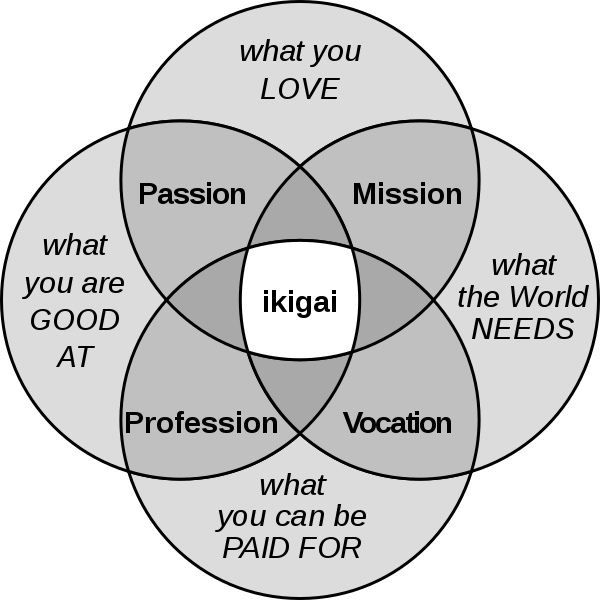Some words are difficult to translate directly into another language. They manage to perfectly capture an idea, mood or feeling which is not necessarily unknown to other cultures, but which is not captured in your own language as succinctly and beautifully. The Japanese concept of “ikigai” is one of those unique ideas that are worth having a closer look at. Ikigai (pronounced ee-key-guy), roughly translates as “reason for being”. It is the thing that gets you out of bed in the morning, makes your efforts and struggles personally worthwhile, and sees you through difficult times and adversity.
Finding your ikigai is not always easy or straightforward. For most people, it involves a committed journey of self-reflection to discover your personal strengths, identify your core values in life, and develop and maintain a sense of meaning and purpose.
Investing the time and effort to identify your ikigai is worth it though: research suggests that focusing on your “reason for being” can reduce anxiety and has a positive impact on resilience, wellbeing and self-esteem. It may also be another way to look at the elusive notion of work-life-balance which often seems impossible to achieve: instead of seeing your work and life as two dichotomous realities which you somehow need to balance out against each other, your Ikigai is the point where they naturally meet and fuse into a positive experience at the core of your identity, enriching your daily life and guiding your decisions.
So how can you find your ikigai? The journey starts with identifying four key elements:
- what you love,
- what you are good at,
- what the world needs, and
- what you can get paid for.
The next step asks you to have a look at the intersection between the above key pillars:
- Your passion is a blend of the things that you love and which you are also good at.
- Your mission in life is a combination of the things that you love and what the world needs.
- Your vocation is about addressing a need in the world and being paid for it.
- Your profession describes the merging of the things that you’re good at and which you can be paid for.
As the below diagram illustrates, your ikigai lies precisely at the point where these concepts converge:

Source:https://commons.wikimedia.org/wiki/File:Ikigai-EN.svg
While this may make the theoretical framework clearer, it may still feel abstract to you, or removed from real life. The following questions can help you to fill the elements with personal meaning:
- To find out what you love doing –
- What kind of activities or tasks do I never get bored of?
- What makes me smile?
- If I was financially secure, what would I do with my time?
- What activities make me lose track of time?
- What would I continue to do even if I did not get paid?
- To discover what you are good at –
- What do people usually approach me for help with?
- If I had to teach something, what would it be?
- What do other people compliment me about?
- What parts of my current role come most easily to me?
- To identify what the word needs –
- What can I do or offer (e.g. a service or product) that would be helpful or meaningful to others (e.g. my family, friends, clients or community)?
- If I could get a message across to a large group of people, what would it be?
- What problems in my community / in society would I like to help solve?
- What valuable skill or knowledge can I pass on to others?
- To explore what you can be paid for –
- Are people willing to pay for what I have to offer?
- Which jobs, positions, or tasks spark my interest?
- What would I be doing if I were not in my current role?
Your ikigai is likely to evolve as your circumstances change over time. You may find it useful to practise this exercise on a regular basis so you can continue to explore different possibilities and respond to changing environments and stages in your life. If you would like to learn more, don’t hesitate to reach out to the QLS Solicitor Support service on ethics@qls.com.au or p. 3842 5843 to speak to someone in a judgement-free and supportive environment.












Share this article